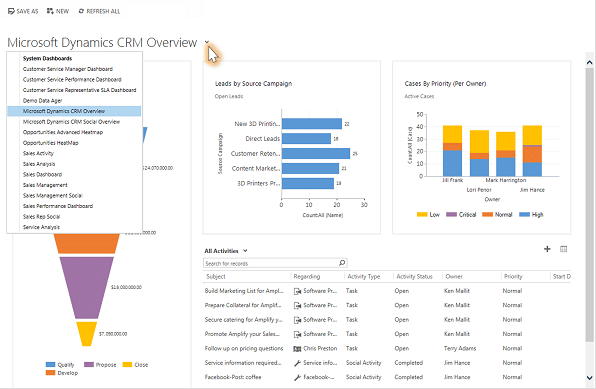Table of Contents
Microsoft’s Dynamics 365 CRM stands out as a diverse and powerful solution in the ever-changing field of customer relationship management (CRM) software. Dynamics 365 CRM is a complete suite of apps customised to address the different demands of modern organisations. It is designed to improve customer interactions, streamline processes, and accelerate corporate success. So, check out the benefits, features, and essential components that make Dynamics 365 CRM a top choice for companies looking to improve their customer interactions and operations.
Understanding Dynamics 365 CRM
Dynamics 365 CRM, short for Customer Relationship Management, is an integral part of Microsoft’s Dynamics 365 suite. This suite encompasses a range of applications that cover various aspects of business operations, including sales, marketing, customer service, and field service. Dynamics 365 CRM specifically focuses on managing and enhancing customer relationships by offering tools and features that facilitate engagement, communication, and data analysis.
Benefits of 365 CRM
360-Degree View of Customers: One of the primary benefits of 365 CRM is the ability to consolidate customer data from various touch points into a unified view. This holistic perspective enables businesses to understand customer preferences, behaviour, and history, which in turn helps in tailoring interactions and offerings.
Enhanced Customer Engagement: Dynamics 365 CRM empowers businesses to engage with customers effectively across multiple channels. With features like personalised marketing campaigns, targeted sales pitches, and proactive customer support, organisations can create meaningful and lasting relationships.
Data-Driven Insights: The CRM’s robust analytics and reporting capabilities provide actionable insights into customer trends and performance metrics. This data-driven approach enables businesses to make informed decisions and refine their strategies.
Streamlined Processes: By automating repetitive tasks and workflows, 365 CRM improves operational efficiency. Additionally, This allows employees to focus on high-value tasks and ensures a consistent and standardised approach to customer interactions.
Scalability and Flexibility: 365 CRM offers scalability to accommodate the growth of businesses. The cloud-based nature of the platform allows for easy customization and integration with other business systems.
Features of Dynamics 365 CRM
Sales Automation: Dynamics 365 CRM includes features that empower sales teams to manage leads, opportunities, and customer relationships effectively. Moreover, Automation of sales processes, forecasting, and territory management contributes to higher sales efficiency.
Customer Service Management: With tools for case management, self-service portals, and omnichannel support, Dynamics 365 sales CRM helps deliver exceptional customer service experiences. Service agents can access relevant customer information and historical interactions to provide personalised assistance.
Marketing Campaigns: The CRM’s marketing module enables businesses to create, execute, and track targeted marketing campaigns. Moreover, This includes email marketing, social media integration, and customer segmentation for precise targeting.
Field Service Optimization: For businesses that provide on-site services, 365 CRM offers features to optimise field operations. Further, Dispatching, scheduling, and resource allocation are streamlined, resulting in efficient service delivery.
Customer Insights: Leveraging AI and machine learning, 365 CRM analyses customer data to provide actionable insights. This helps businesses anticipate customer needs. As well as, recommend relevant offerings, and identify potential upselling opportunities.
Voice of the Customer: Dynamics 365 Customer Voice allows organisations to collect and analyse customer feedback through surveys and feedback forms. Additionally, This feature aids in understanding customer sentiment and areas for improvement.
Key Components of 365 CRM
Dynamics 365 Sales:
This component focuses on managing the sales process, from lead generation to closing deals. Moreover, It offers tools for pipeline management, sales analytics, and collaboration among sales teams.
Dynamics 365 Customer Service:
Dedicated to providing exceptional customer support, this component assists in case management, knowledge base creation, and self-service portals for customers.
Dynamics 365 Marketing:
This module enables businesses to design and execute targeted marketing campaigns while tracking their effectiveness and ROI.
Dynamics 365 Field Service:
For organisations offering field-based services, this component optimises scheduling, dispatching, and resource management for on-site operations.
Dynamics 365 Customer Voice:
This component collects and analyses customer feedback. However, allowing businesses to gain insights into customer satisfaction and areas for improvement.
Dynamics 365 Implementation and Partner Support:
Organisations often partner with Dynamics 365 implementation experts like Dynamics Square UK to ensure a smooth deployment and integration process. Further, These partners offer guidance and support to maximise the CRM’s benefits.
Summing up
In Conclusion, Dynamics 365 CRM is a dynamic and all-encompassing solution that enables organisations to cultivate customer connections, streamline processes, and drive development. It serves the diverse demands of sales, marketing, customer support. As well as, field service teams by providing a wide range of advantages, features, and specialised components. Organisations may improve customer interaction, obtain actionable insights. Lastly, generate long-term competitive advantages by harnessing the power of 365 CRM.


